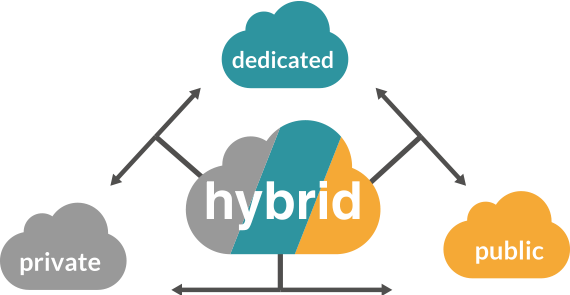Dedicated vs VPS vs Hybrid – Which One Best Fits Your Business?
Deciding what type of server you’re going to host with can be daunting indeed. How can you figure out which one is the best option for your organization?
Are you stumped about which hosting plan you should choose for your business? You definitely aren’t alone in that. Working out which type of server best fits your needs can be one of the most daunting choices you’ll ever make as a client – even more so than the host you choose to work with.
One of the reasons it can be so overwhelming is the sheer volume of choices at your disposal. Today, we’re going to help you decide between three in particular – dedicated hosting, VPS hosting, and hybrid hosting. Let’s get started.
Dedicated Hosting
First on our list is dedicated hosting – and it’s basically exactly what it sounds like. You receive an entire server devoted to your needs as a client. Everything on the server is yours to control, from the software you install to the hardware you’re running.
Dedicated hosting is undoubtedly the most powerful option on our list. Not surprisingly, this also makes it the most expensive. Even so, for businesses with resource-intensive application platforms, specific security requirements, or unique hardware needs, a dedicated server’s the way to go.
VPS Hosting
Next up, there’s VPS hosting – which is a bit more difficult to conceptualize than dedicated hosting. Basically, a client that signs up for a virtual private server receives a virtualized machine; a simulated hardware and operating system environment hosted on a physical server with several other hosting clients. If it helps, you can visualize VPS hosting as a more powerful shared hosting environment – you’ve fewer clients with whom you’re sharing the resources, and you’ve always got a guaranteed amount of CPU, RAM, and disk space.
Additional resources can also be provisioned with a few clicks(within reason, of course).
Virtual private servers also provide clients with a great deal more control than shared hosts – almost as much as dedicated servers, in fact. Save for the hardware on which your server is run, everything on a virtual private server is under your command. This makes a virtual private server ideal for running FTP, DNS, and web servers.
Generally, VPS hosting will fit the needs of most small to mid-sized businesses.
Hybrid Hosting
A hybrid server is a ‘mid-range’ option, falling somewhere between VPS hosting and dedicated hosting. In essence, it’s a supecharged VPS, hosted on a significantly more powerful server node. This means it comes with many of the same benefits as a standard VPS, and the same basic level of control.
While hybrid hosting doesn’t offer as much power as dedicated hosting, a hybrid server is still significantly more powerful than a virtual private server. It offers higher resource allowances and a volume of free burstable resources. If your business’s needs aren’t being met by a VPS plan, but you know for a fact you don’t need the volume of resources offered by dedicated hosting, then you should use a hybrid server.
Which One Should Your Business Choose?
Now that you know the options that are available to you (and have a general idea of what type of business should use each server type), the next step is for you to actually make a decision. To that end, I’ve taken the liberty of laying out a few of the factors you’re going to need to consider.
Ask yourself the following questions when choosing your hosting plan:
- What do I intend to use this server for?
- How resource-intensive are my applications? Will I frequently be using a high volume of memory or bandwidth?
- Do I have specific hardware needs that it might not be possible to virtualize?
- Is it a problem that I might share a server with several other virtualized containers? Does this run counter to my organization’s security policies?
- How large is my business, and how much scaling do I expect to do in the next several years?
- How large is my website, and how much traffic does it receive on a daily basis?
- What does my budget look like? Can I afford a dedicated server, or would it be better to choose a hybrid or VPS plan?
- How many people will require regular access to my server, and what does that mean for my bandwidth and memory requirements?
Selecting a hosting plan for your business can be a daunting choice – but it doesn’t need to be. It’s all about going in prepared. So long as you know what options are available to you and understand the needs of your organization, you’ll do just fine.
About the author:
Rachel Gillevet is the technical writer for WiredTree, a leader in fully managed dedicated and vps hosting. Follow Rachel and WiredTree on Twitter, @wiredtree, Like them on Facebook and check out more of their articles on their web hosting blog, https://www.wiredtree.com/blog/















